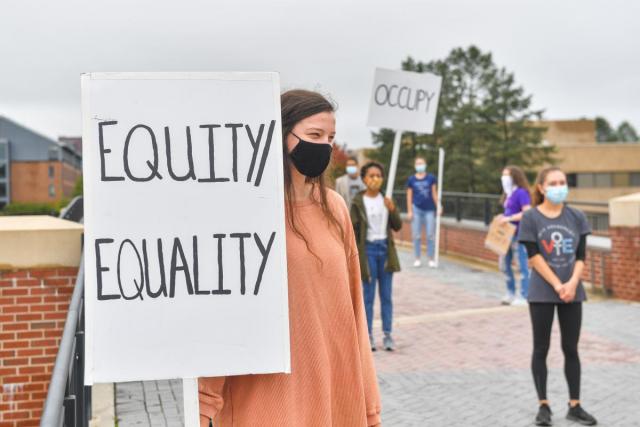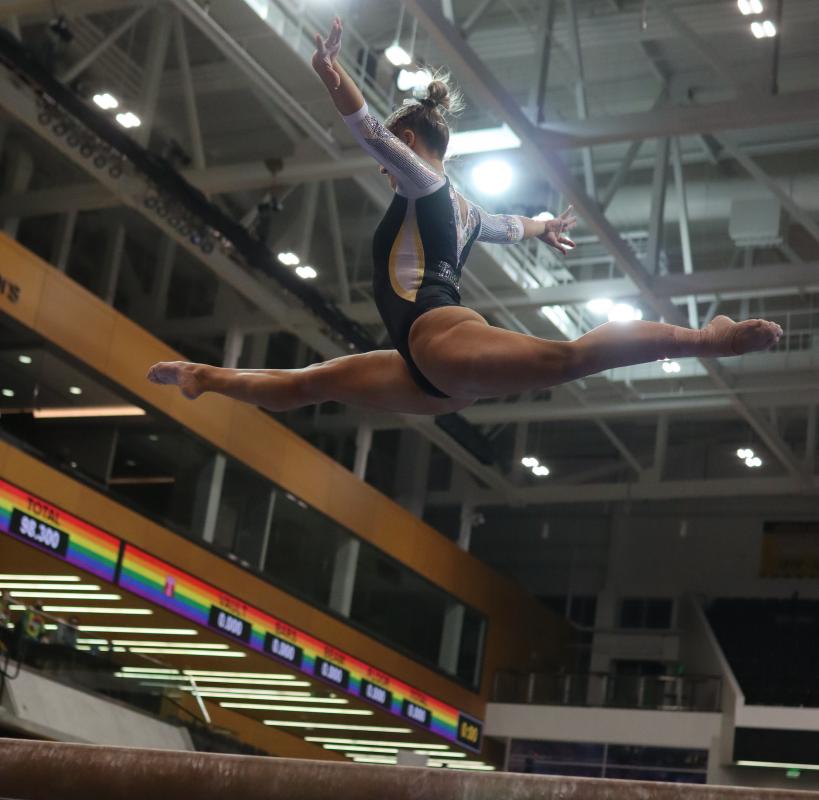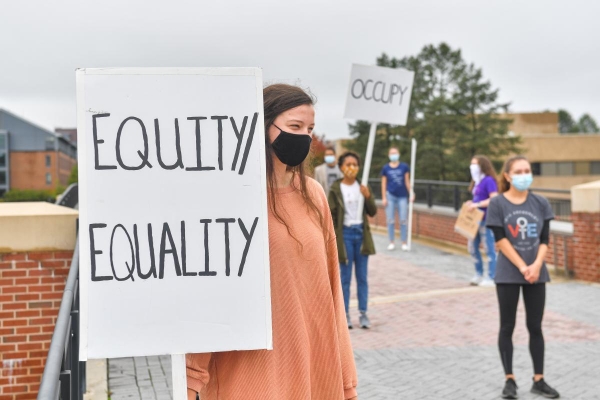
An advocacy group for LGBTQ equality in sports that grades Division I athletic departments’ policies and practices is raising awareness about inclusion of transgender athletes and pushing colleges to do better.
April 5, 2021
Members of the Towson University Athletes for Inclusion, Diversity and Equity, or TUAIDE, demonstrate at a voting event on campus.
LGBTQ advocacy groups are calling on college athletic departments to support the participation of LGBTQ students in intercollegiate athletics and to affirm their right to protection in the face of growing political hostility.
The demand by advocates comes at a time when lawmakers in various states are proposing or adopting legislation banning transgender women from competing on women’s sports teams and as the Biden administration reviews Department of Education policies on the participation of transgender athletes on intercollegiate and K-12 teams. The LGBTQ advocates are concerned about whether the athletes will be protected from discrimination given the policies implemented under former secretary of education Betsy DeVos that were aimed at preventing transgender athletes from competing in college and K-12 sports programs.
The advocates want college athletics administrators to enact and publicly support inclusive policies and practices that protect LGBTQ athletes and ensure staff members are adequately trained, said Anna Baeth, director of research for Athlete Ally, a national organization that advocates for LGBTQ inclusion and equality in sports. The group released its third Athlete Equality Index today, which rates the policies of all 353 institutions in Division I of the National Collegiate Athletic Association and how they treat LGBTQ students. The index is an accountability measure to ensure the equal participation of LGBTQ athletes in sports programs.
Most Popular
Baeth said more of these institutions now have formal written policies about transgender inclusion on their sports teams than in previous years, which reflects a growing commitment to protect these students in response to policy makers attempting to ban their participation.
However, Athlete Ally reported that overall, 92 percent of NCAA Division I athletic departments did not have “fully inclusive trans athlete policies” as of March 2021, according to a summary of this year’s equality index published online, as a searchable database. Additionally, only 2.8 percent, or 10 Division I athletic departments nationwide, “fully protect and support their LGBTQ+ identities” and received a perfect 100 score based on Athlete Ally’s criteria for inclusive department policies and practices.
“Unfortunately, the overwhelming majority of LGBTQ+ students, particularly those who identify as transgender and nonbinary, face discrimination, harassment or other barriers when they seek to participate in athletics at school,” Melanie Willingham-Jaggers, interim executive director of GLSEN, the Gay, Lesbian and Straight Education Network, said in a written statement. “Every college and university has a responsibility to take these findings to heart, and take active steps to foster acceptance for LGBTQ+ students in athletics through the implementation of inclusive sports guidance.”
Baeth said most of the criteria for the index are based on the NCAA’s existing guidelines for LGBTQ inclusion, which colleges must follow to participate in sports championships. However, many schools simply provide a link to the NCAA policy and do not have their own written policies. The NCAA guidelines also do not require an explicit transgender inclusion policy, which Athlete Ally strongly encourages.
Departments are rated on the existence and public availability of other various statements and policies, including an LGBTQ nondiscrimination statement, a code of conduct for college sports fans that ensures LGBTQ nondiscrimination, and training on LGBTQ inclusivity for athletes and athletics staff, among other assurances, Baeth said.
“We looked at what affects students and what is possible for each and every athletic department, no matter their size, no matter their location,” said Baeth, an expert in kinesiology and sport sociology and a former research assistant in the Tucker Center for Research on Girls & Women in Sports.
Thomas Harris, assistant athletic director for diversity, inclusion and engagement at the University of Arizona, which received a perfect score on the index, said Athlete Ally’s standards for LGBTQ inclusion are “foundational” for every college athletic department and do not require significant investment of resources.
Baeth noted that while many institutions have recently hired athletics staff members exclusively dedicated to diversity, equity and inclusion work, many colleges cannot afford to do so because of the impact of the coronavirus pandemic on department budgets.
Harris said the Arizona Athletics Inclusive Excellence Council, a group of athletics staff members that develop diversity and inclusion programming, began to focus more on LGBTQ inclusion after Athlete Ally reached out to him in 2019 to address his department’s low index score at the time. The department subsequently added a Transgender Participation Policy to its handbook for athletes and updated its nondiscrimination policy and code of conduct for Wildcat fans, which now includes discrimination based on sexual orientation and gender identity.
“What they are grading us on, half of it is something you could do in 30 minutes — updating your policies in your student athlete handbook and updating policies to put on your website,” Harris said of the Athlete Ally index criteria. “The majority of it is interlevel stuff that everybody should do.”
The university’s policy on transgender participation adopts the NCAA’s Policy on Transgender Student-Athlete Participation, which was developed in 2011 and which Baeth argues needs to be reconsidered and updated. The NCAA rules require male-to-female transgender athletes to complete one year of testosterone suppression treatment before participating in women’s sports, and disqualifies female-to-male transgender athletes from participating in women’s sports if they have started testosterone treatment, according to the NCAA’s Transgender Handbook.
Baeth called this decade-old standard “a misstep that many sport legislative bodies have taken” and said it discriminates against male-to-female transgender athletes because of the period they must wait to participate after starting hormone treatment.
“There’s inherent bias in terms of how female and male athletes are treated,” she said. “It’s a bitter pill to swallow, to say that you are creating equal opportunities for male and female athletes and then to read something like that.”
Allowing the participation of transgender athletes in college sports while ensuring cisgender women still have an equal opportunity to compete and succeed in athletics is at the center of heated debates among policy makers, college athletics thought leaders and the general public, and is the basis for many recent state laws and proposals on transgender athletes in women’s sports. Donna Lopiano, president of the Drake Group, a national organization that advocates for college sports reform, has taken on this issue as a member of the newly formed Women’s Sports Policy Working Group, which researches transgender participation in sport and lobbies “to establish middle ground that both protects girls’ and women’s sport and accommodates transgender athletes.”
Lopiano said Athlete Ally’s index criteria are “absolutely essential” for athletic departments.
“There should be better education of athletes, coaches and fans,” Lopiano said. “Nobody should be bullying a transgender athlete.”
However, she’s concerned about full transgender athlete participation without accommodations that maintain a level playing field for cisgender women athletes. Such accommodations could include, for example, creating a separate division for the scores of transgender women athletes to be recorded in individual sports such as track and field. She worries that Athlete Ally’s “standard for inclusivity for competition is that transgender women are treated identically” as women assigned female at birth without such accommodations.
If a college team has a transgender female participant who is not taking hormones to suppress testosterone, “we should talk about that, respect that decision to keep a male body, embrace her on the women’s team, and we have to figure out a way to include her with an accommodation,” Lopiano said.
Baeth said institutions were not penalized in the index ratings for following the NCAA’s current standard for transgender athlete participation based on the hormone treatment requirements outlined in the Transgender Handbook, despite Athlete Ally’s belief that transgender women should be treated equally to cisgender women, regardless of the status of their hormone treatment. The index looked at policies that “are actually within the control of the athletics departments,” she said.
Tricia Brandenburg, deputy director of athletics and senior woman administrator at Towson University, a Division I institution in Maryland, said NCAA rules disqualified an athlete assigned female at birth at the university from playing on the women’s soccer team when the player decided to begin treatment to transition to a man. With no men’s soccer team, the university had to navigate how to keep the player on the team without his participating on the field, Brandenburg said. The player was made a student coach for the team and continued to travel with and participate in team activities, Brandenburg said.
“That really gave me perspective that these are really individual situations and there can’t be a cookie-cutter process for this,” Brandenburg said.
 Towson University Athletes for Inclusion, Diversity and Equity, or TUAIDE, an organization recently created at the urging of student athletes, is helping guide athletics department policy on LGBTQ inclusion.
Towson University Athletes for Inclusion, Diversity and Equity, or TUAIDE, an organization recently created at the urging of student athletes, is helping guide athletics department policy on LGBTQ inclusion.
Brendan Farrar, a sophomore on the men’s swimming and diving team and member of the LGBTQ work group in TUAIDE, said he realized the athletic department’s policy shortcomings when it received an index score of 55 from Athlete Ally. But Farrar, who said he is questioning his sexual orientation, is excited that the department is engaging with athletes on how to improve.
Baeth, of Athlete Ally, also noted the importance of including LGBTQ athletes in discussions on how to improve department practices and policies. Farrar said the Towson work group, which launched in January, will bring about positive change for future LGBTQ athletes at the university.
“I’m able to bring more than just one identity to the pool deck and the classroom every day,” Farrar said of his status as an athlete. “When you talk about teacher wages, you want to bring in teachers. When you talk about Black issues, you want to bring in Black figures … This is a great reflection or example for other schools.”
You may also be interested in…
Today’s News from Inside Higher Ed
Inside Higher Ed’s Quick Takes


